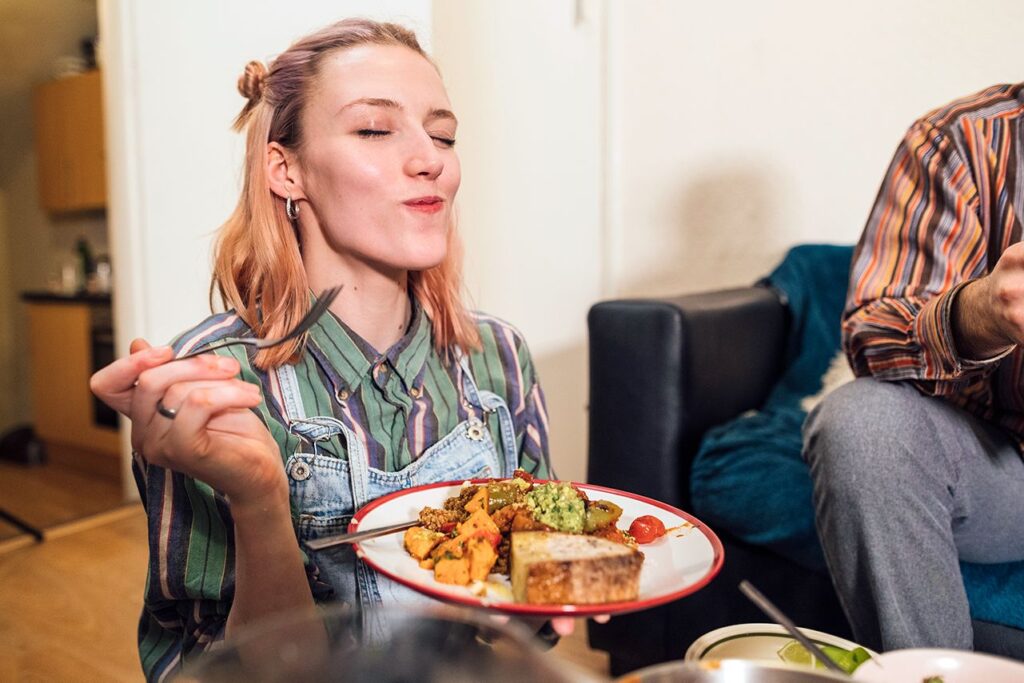Breakfast: one hard boiled egg, washed down with a glass of chardonnay. Lunch: two more eggs, double the chardonnay. Dinner: down the rest of the bottle with a steak and a splash of lemon juice. – Vogue, 1977.
This real crash diet advice is bizarre and almost comical, but it’s also unhealthy, restrictive, and dangerous. And while it was published in the 1970s, we haven’t moved on. In 2021, similar rhetoric persists on Instagram. It’s not eggs with a glass of dry white, but it’s appetite suppressant lollipops and gummies, advertised to millions of followers by brands like Flat Tummy Co and endorsed by some of Instagram’s most-followed celebrities (looking at you, Kim Kardashian).
Not all diet products are that extreme, of course. But they are all based on the premise that restricting food will help us lose weight, and that will make us happy. But it’s a fantasy. Not least because 95 percent of the time, diets fail. But what if we allowed ourselves to lose the rules and the restrictions, and eat for joy instead? A growing body of nutrition professionals, called anti-diet dietitians, believe we can stay healthy, both mentally and physically, with an approach to food called intuitive eating. And, in part, it’s focused around making space for joy on our plates.
Embracing joy with anti-diet intuitive eating
If you watched Marie Kondo’s tidying up hit when it landed on Netflix in 2018, you’ll know that the decluttering expert’s KonMari method is all about finding joy in our possessions and losing what doesn’t serve us. That’s kind of like intuitive eating: looking at the foods we love, and following a varied diet filled with the snacks and meals that bring us and our taste buds joy and satisfaction.
Anti-diet dietitians operate on the basis (supported by a number of studies) that restriction-focused diets do not work. Instead, they encourage people to consume a variety of foods that they enjoy, from cake to bananas, guilt-free. This approach to food is centered around trust: Trusting your mind to listen to your body’s cues, and eat in a way that’s healthful for you. The concept applies regardless of the lifestyle you follow, from plant-based to flexitarian.
While intuitive eating’s professional advocates do take nutrition science into account, they do so alongside body autonomy and taste preferences. They work directly with clients to create dietary plans that are unique to them and their needs. Most importantly, they put aside the idea of breaking up foods into “good” and “bad” categories—an approach that diet culture thrives on.
“Part of intuitive eating is seeing all foods as neutral,” says registered dietitian Heather Caplan. “We’re allowed to have food preferences. To enjoy what we eat. The binary framing of foods as ‘good’ or ‘bad’ negates the nuanced experience of eating and nutrition.”

So, how do you start eating intuitively?
Opting for guidance from a professional is a smart move when experimenting with intuitive eating. But if you’re starting out on your own, registered dietitian and nutritionist Christine Byrne has a few guidelines to follow.
First, honor your hunger (when your tummy rumbles, don’t ignore it). Give yourself permission to eat what you want, when you want, and try to push food rules (like the “good” and “bad” categories) to one side. Feel your fullness (it’s ok to eat past the point of being full, we all do it. But try to listen to what your stomach is telling you). And accept that all of this might not feel normal right away, especially if you’ve spent a lot of time immersed in diet culture.
At its core, intuitive eating is about paying attention to how you feel, says Byrne. “The first thing to tackle isn’t how much food you’re eating, it’s how you are reacting to it,” she notes. “It’s your thoughts about food. Are you judging yourself? Do you feel guilty? Sorting through that first is more important than feeling like you must be in tune with your hunger and fullness.”
The research-backed benefits
There is research to support this approach. A recent meta-analysis published in the International Journal of Eating Disorders evaluated nearly 100 former studies on intuitive eating. The researchers discovered that intuitive eating patterns are associated with a positive body image and high self esteem. They also found that intuitive eaters were less likely to binge eat or restrict, and had fewer symptoms of anxiety and depression.
Restrictive diets, however, can have dangerous consequences. Research suggests there is a link between yo-yo dieting (which is following a restrictive diet, losing weight, ditching the diet, regaining the weight, and dieting again) with muscle loss, an increased risk of heart disease, and higher blood pressure.
And using diet products to aid with weight loss is a high risk too. Detox tea and smoothie products contain laxatives, overuse of which can result in long-term heart health problems, electrolyte loss, and for some with digestive tract problems, diarrhea and stomach cramps. Despite the risks, a quick search for #detoxtea on Instagram reveals 1.2 million posts, one of which offers a ’70s Vogue style diet plan consisting of only small snacks, lemon water, detox smoothies, and herbal tea.

Separating the truth from the marketing
Like most major money-making industries, the diet industry thrives on very convincing marketing to make its sales. And it works: In 2015, Flat Tummy Co sold for $10 million. Dwarfing that, WW International (formerly known as Weight Watchers) is valued at more than $1.2 billion. In its entirety, the global weight loss industry is worth more than $254 billion.
And when it suits them, even governments will push the idea that “good” foods will make us look and feel great, while “bad” foods will do the opposite. (To illustrate that this is really sales-driven, there are proven financial links between the fast food industry and politicians.)
Take the term “empty calories,” for example. The phrase, which has been welcomed into the diet industry, appeared for the first time in the USDA’s MyPlate dietary guidelines around 10 years ago. It was used to describe a calorie that has no nutritional value. But food can’t be simplified to this extent, says Byrne. “A calorie is a nutrient. You can’t say that it’s empty,” she says.
Even so, MyPlate grouped together foods like soda, candy, burgers, and pizza as sources of empty calories. But foods are nuanced: a pizza recipe consists of so many variables, from the ingredients it’s topped with to what goes in the base. And burgers, for example, can be made from quinoa or Beyond Beef. You can’t equate the two, but both offer some nutritional value.
“The idea of an empty calorie is not a helpful concept, and it’s also not a true concept,” Byrne explains. “You’re getting nutrition from anything that you eat. Everything is giving you something.”
Letting go of the rules, and embracing joy
Intuitive eating empowers people to push away diet industry language, but it also allows them to accept that food plays many roles in our lives. Nutrition is one of its important assets, but it can also provide comfort or joy or connection. Think of Christmas, for example, or the Thanksgiving table, or a birthday cake. Everyone has the right to embrace joy when they eat, without guilt or shame. Without picking up an appetite suppressant lollipop beforehand.
“It is completely natural to eat for reasons other than hunger, we’ve been doing that for so long,” Byrne explains. “You can eat for joy. You can eat for comfort. You can eat as a way to soothe loneliness.” As long as it isn’t the only one you have, food is a perfectly acceptable coping mechanism, she says.
Intuitive eating leaves room for food to provide us with so much more than just vitamins and minerals, in a way that the diet industry does not. “Diet culture tries to get us to operate as robots, just needing numbers and calculations,” adds Caplan. “This is part of why diets feel unsustainable for so many people—we are humans who have emotional and physical needs; we are not robots that just need to satisfy an equation.”


